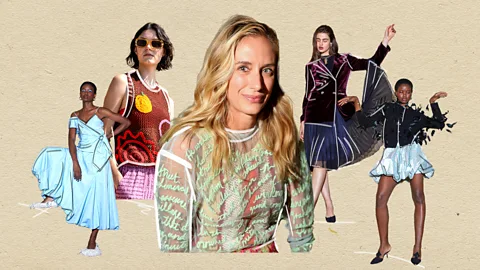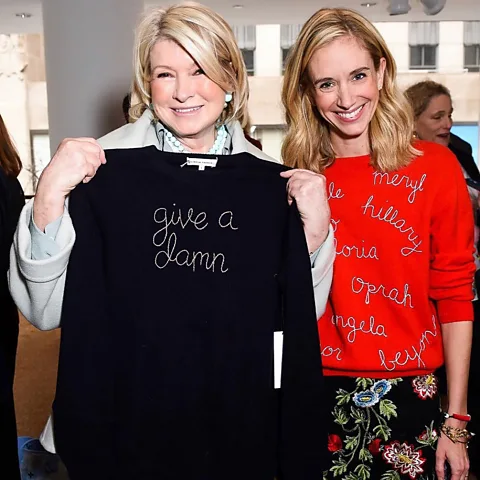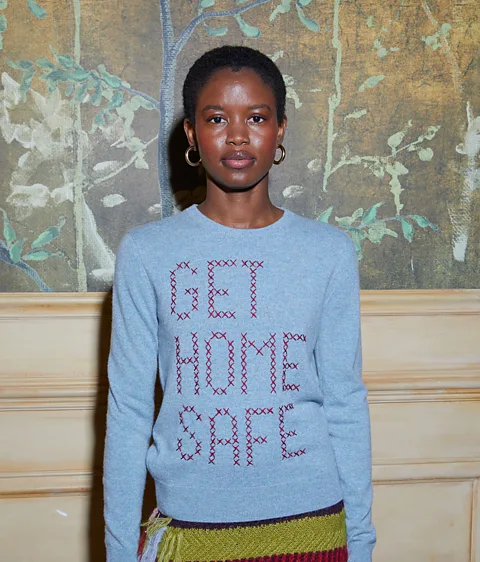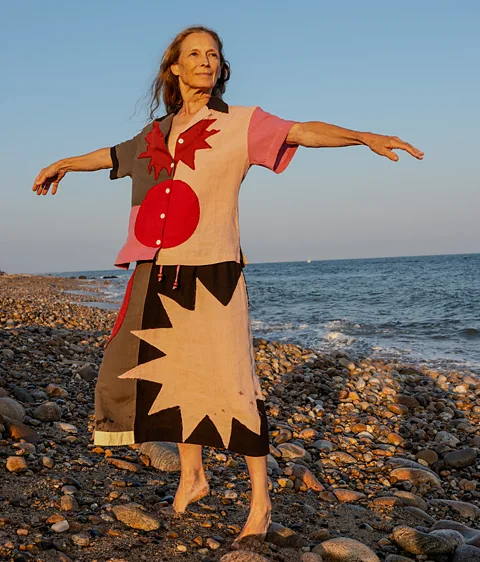[ad_1]
 Serenity Strull/ BBC/ Lingua Franca
Serenity Strull/ BBC/ Lingua FrancaRachelle Hruska McPherson, founder of cult brand Lingua Franca, talks about sloganeering and “luxury activism”.
You may have spotted the sweaters around. Snug and slightly fuzzy to the touch, the cashmere crewnecks come in leather-book-cover shades like navy and maroon. They are branded with square labels that say “Lingua Franca” in a loopy, girlish font. But the real branding comes from the embroidery across the chest, which looks delicate and sweet, and makes statements like “I read banned books”, and “Educate girls, change the world”.
 Lingua Franca
Lingua FrancaLingua Franca was founded by Rachelle Hruska McPherson, who also created the Gossip Girl-coded party website Guest of a Guest. A former “girl boss” who now declares that “girl bosses are dead”, she initially began embroidering sweaters to cope with postnatal depression in 2017. “I couldn’t sleep or eat. But I could sew,” she says. A pile of prototype sweaters that read “Booyah” developed a cult following in the tiny but stylish beach town of Montauk, New York, where celebrities like Leonardo DiCaprio scooped them up. But it wasn’t until a sweater that read “I Miss Barack” – as in, Obama – went viral on Instagram in 2018 that Hruska McPherson pivoted a large chunk of her business to politically-minded cashmere, which blares bold messages, and costs about $400 (£300) per piece.
Lingua Franca took the concept further, turning its status sweaters into a constant cashmere chant for progressive issues. Among its slogans: “We say gay,” “Dr Fauci fan club,” and “When there are nine,” referring to Supreme Court Justice Ruth Bader Ginsburg‘s 2015 testimony about women running the judicial system. The sweaters donate 10% of their sale price – about $38 (£28) – to foundations like gender parity NGO She Should Run and the Surfrider Foundation, which fights to reduce the amount of plastic in the ocean. (Both nonprofits have official partnerships with the brand.)
 Lingua Franca
Lingua FrancaUnderstandably, when fashion combines status spending with messages of equality and inclusion, people get angry. Dior’s costly feminist T-shirt, and its appearance on a runway overrun by super-young, super-thin models, had journalists like the Sydney Morning Herald’s Annie Brown asking “where is the accountability” beyond wielding a slogan? Lingua Franca’s buttery-soft sweaters drew similar scepticism, especially when Connie Britton wore one of the $380 (£284) cashmere tops to the Golden Globes in 2018. It read, “Poverty Is Sexist”, and got some jaw-drops from pundits. Journalist Kim Kelly argued “for that price, City Harvest could’ve delivered 1,524 tons of food for our city’s hungry”. Jonah Goldberg, a columnist for the Los Angeles Times, condemned Lingua Franca’s brand of fuzzy feminism, “stupidity”.
On X, Britton argued that nearly every woman at the Golden Globes was wearing a piece of luxury fashion costing far more than $380 – at least her top “added to the conversation” in a meaningful, immediate way. Could that way have also been a recycled T-shirt with the same hand-embroidered message? Sure. But it wouldn’t have felt, or looked, as beautiful.
Hruska McPherson notes that by wearing a progressive slogan, women turn their wardrobes into talking points for family and friends, creating a type of grassroots activism that centres issues inside the very wealthy communities that have the political and economic capital to help change them.
THE CHANGING ROOM
The Changing Room is a column from the BBC that spotlights the fashion and style innovators on the frontlines of a progressive evolution.
Celebrities like Reese Witherspoon, Oprah, Meryl Streep and Jennifer Lopez have all embraced Lingua Franca’s ethos. And Hruska has looked harder at how issues of inclusion can be addressed through her business model. In 2021, she introduced embroidered sweatshirts and tees at lower price points. She also readily admits her racial and economic privilege is “very real”.
“Radical chic”
All this makes the designer a bullseye target for online trolls and sophisticated cultural critics alike. In a 2020 article on The Cut charting her success, author Marissa Meltzer branded Hruska McPherson a “resistance socialite”, and drew parallels to Marie Antoinette play-acting at being a working girl in Le Petit Trianon. But Meltzer also called the business itself an exercise in “radical chic”, an admission that an all-or-nothing approach to luxury style is both unreasonable and, in the case of fashion, pretty boring.
Hruska McPherson is also diversifying her revenue stream through a brisk customisation business. “People want their private jokes, their favourite song lyrics, the names of their children,” she says. “And you know, when you make something custom, that means something to you. That doesn’t go in a landfill. When something gives you joy, you hold on to it. And I think fashion has really ignored joy as a key tenet of sustainability. If something brings you happiness, you’re going to hold on to it.” Similarly joyful is the brand’s nascent ready-to-wear line of tweedy blazers, metallic knit camisoles and acid-green striped dresses that seem to channel a psychedelic version of the Bloomsbury Group.
 Lingua Franca
Lingua FrancaAnd she is still learning, she says. She used to make all of Lingua Franca’s charity deposits herself, and film the whole process for Instagram. “Then my friends were like, ‘Rachelle, we need to tell you something. It’s really cringey for you to post that stuff online. It makes you seem really bougie. Just donate and go back to knitting stuff.'” Was Hruska McPherson offended? “No, I loved it!” she laughs. “And you can say whatever you want to me,” she says. “As long as you say what you mean. If the sweaters can do it, then so can you.”
[ad_2]
Source link


